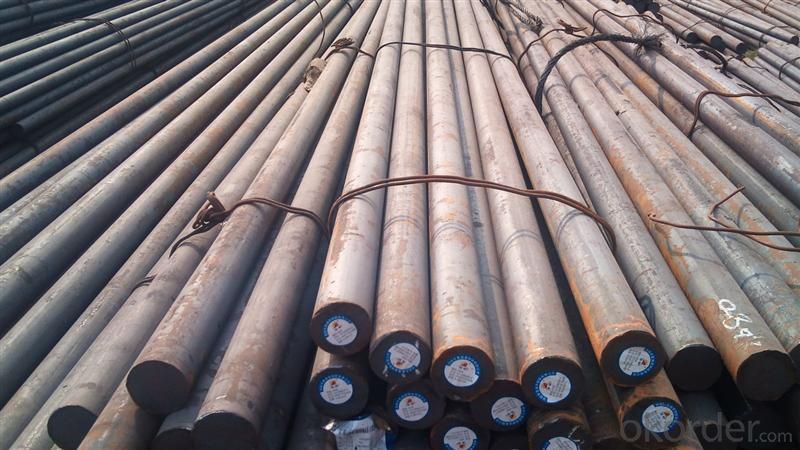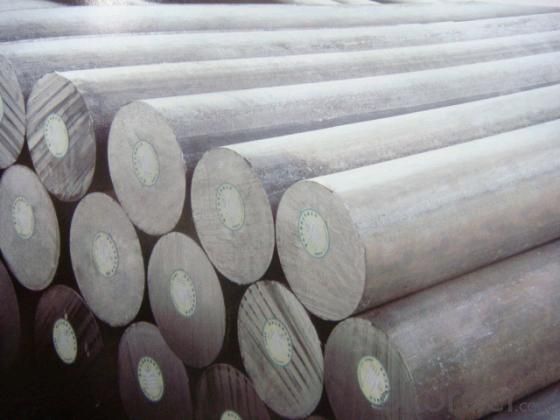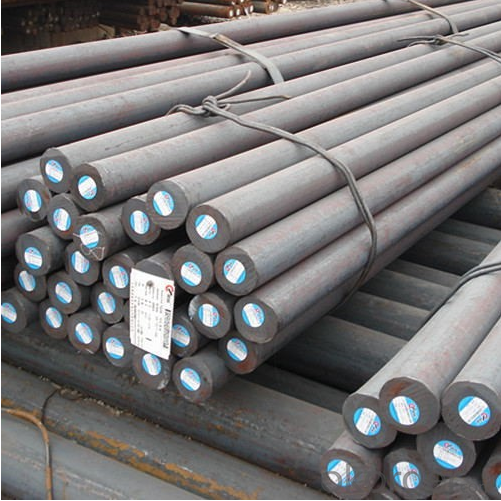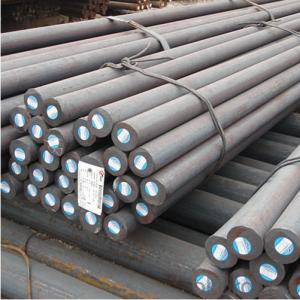30Cr JIS SCr430 DIN1.7030 ASTM 5130
- Loading Port:
- Tianjin
- Payment Terms:
- TT OR LC
- Min Order Qty:
- 25 m.t.
- Supply Capability:
- 50000 m.t./month
OKorder Service Pledge
OKorder Financial Service
You Might Also Like
Item specifice
30Cr JIS SCr430 DIN1.7030 ASTM 5130
Product Description:
1. Grade: 30Cr JIS SCr430 DIN1.7030 ASTM51300
2. Specification: Dia: 80~800mm Length:2000-13000mm or as required
3. Process: EAF+LF+VD+ Forged+ Heat Treatment (Annealed,A Normalized, Q+T)
4. Machine Capability
Tensile strength (N/mm2Mpa): >=885
Elongation %: >=11
Yield strength: >=685
Hardness: HBS less than 187
Reduction of area:>=45%
5. Inspection: 100% Ultrasonic according to the test standards:SEP1921-84,GR.3 CLASS C/C or by SGS ,AHK or Alex Stewart
6. Packing situation: standard seaworthy packing or as customer required
7. Delivery time: 45 days after order confirmed
8. Payment: T/T or L/C at sight.
Chemical Compositon:
C | Si | Mn | Cr | Ni | Cu |
Equal or less than | |||||
0.27-0.34 | 0.17-0.37 | 0.50-0.80 | 0.80-1.10 | 0.30 | 0.30 |
Application:
(1) Generally used for producing the important parts with high strength and good plastic.
(2) After nitrogen treatment, used for producing the important parts with special performance
requirements, such as shafts, gears, fasteners, bolt of large dia steamer etc.
Advantage:
1, Fast response in reply
2, Good communication sales with reasonable price.
3,Good quality materials.
4,Fast lead time.
5,Rich experience in export business.
6,Well after sales service.
Product Show:



- Q:How is special steel used in the mining supply chain?
- Special steel is used in various components and equipment used in the mining supply chain. It is commonly used in the construction of heavy machinery, such as mining trucks, excavators, and drilling rigs, as well as in the fabrication of conveyor belts and crushing equipment. Additionally, special steel is utilized in the production of wear-resistant parts, such as grinding balls and liners, which are crucial for efficient ore processing. Its exceptional strength, durability, and resistance to extreme conditions make it an essential material in the mining industry, ensuring safe and efficient operations throughout the supply chain.
- Q:What are the limitations of using special steel in marine environments?
- Special steel can be susceptible to corrosion and pitting when exposed to saltwater in marine environments. Additionally, the high cost and difficulty in sourcing and maintaining special steel can also be limiting factors.
- Q:How does special steel contribute to the power transmission sector?
- The power transmission sector relies heavily on special steel due to its exceptional properties and performance characteristics. Special steel is highly valued for its strength and resilience, making it an ideal material for manufacturing various components of power transmission systems. For example, transmission towers require special steel for their stability and durability, even in extreme weather conditions. Additionally, special steel's resistance to corrosion is particularly advantageous in the power transmission sector. Power transmission equipment often faces harsh environments, such as high humidity, chemical pollutants, and saltwater exposure, which can speed up corrosion. By using special steel in the manufacturing process, the risk of corrosion-related failures is significantly reduced, ensuring a reliable and uninterrupted power transmission. Furthermore, special steel's excellent electrical conductivity makes it a perfect choice for conductors and cables used in power transmission. Efficient transfer of electrical energy is crucial to minimize power losses and optimize the transmission process. Special steel conductors offer low resistance to the flow of electricity, enabling efficient power transmission over long distances. Moreover, special steel is also employed in the production of transformers and other electrical equipment used in power transmission. The magnetic properties of special steel make it an excellent material for transformer cores, facilitating efficient energy conversion and minimizing energy losses during transmission. In summary, special steel greatly contributes to the power transmission sector by providing strength, corrosion resistance, electrical conductivity, and magnetic properties. These properties ensure the reliability, efficiency, and longevity of power transmission systems, ultimately supporting the uninterrupted supply of electricity to industries, businesses, and households.
- Q:What are the common quality control measures for special steel?
- Common quality control measures for special steel include: 1. Chemical Composition Analysis: Special steel often requires specific chemical compositions to meet the desired properties. Quality control measures involve analyzing the chemical composition through techniques like spectrometry to ensure it meets the required specifications. 2. Mechanical Testing: Special steel needs to possess specific mechanical properties such as strength, hardness, toughness, and ductility. Quality control measures involve conducting mechanical tests like tensile testing, hardness testing, impact testing, and fatigue testing to ensure the steel meets the required standards. 3. Non-Destructive Testing: Non-destructive testing methods like ultrasonic testing, magnetic particle testing, and dye penetrant testing are employed to detect any internal or surface defects in the steel. These tests help ensure the integrity and reliability of the special steel. 4. Dimensional Inspection: Special steel often requires precise dimensions for its intended application. Dimensional inspection involves measuring the length, width, thickness, diameter, and other critical dimensions to ensure they meet the required tolerances specified by the customer or industry standards. 5. Surface Quality Inspection: Special steel may require specific surface finishes or coatings to enhance its performance or resistance to corrosion. Quality control measures involve inspecting the steel surface for defects such as cracks, pits, scratches, or unevenness to ensure it meets the required surface quality standards. 6. Heat Treatment Verification: Special steel often undergoes heat treatment processes like annealing, quenching, or tempering to achieve the desired mechanical properties. Quality control measures involve verifying the effectiveness of the heat treatment process through hardness testing or microstructure analysis. 7. Documentation and Traceability: Quality control measures also involve maintaining comprehensive documentation and traceability records of the special steel, including details of its production process, chemical composition, mechanical properties, and any inspections or tests performed. This helps ensure quality consistency and provides a reference for future use or troubleshooting. By implementing these quality control measures, manufacturers can ensure that special steel meets the required specifications, providing customers with high-quality and reliable products for their specific applications.
- Q:How does special steel contribute to the transportation equipment industry?
- Special steel plays a crucial role in the transportation equipment industry by providing high strength, durability, and resistance to wear and corrosion. It allows for the construction of lighter yet stronger components, leading to improved fuel efficiency, increased payload capacity, and enhanced safety in vehicles. Additionally, special steel enables the production of precision parts and components, ensuring the reliability and performance of transportation equipment.
- Q:Can special steel be used for luxury goods?
- Yes, special steel can definitely be used for luxury goods. Special steel, known for its exceptional durability, strength, and unique properties, can be utilized in the production of high-end luxury goods such as watches, jewelry, knives, and even high-performance vehicles. Its superior quality and aesthetic appeal make it an ideal choice for manufacturers seeking to create luxurious and exclusive products.
- Q:How does special steel perform in terms of corrosion resistance in marine environments?
- In marine environments, special steel, also known as stainless steel, exhibits exceptional performance in terms of resisting corrosion. This is mainly attributed to the high levels of chromium and nickel present in its alloy composition. The chromium content creates a protective oxide layer on the steel's surface, commonly referred to as the passive layer. Acting as a shield, this layer prevents direct contact between the steel and corrosive elements found in marine environments, such as saltwater. Furthermore, the presence of nickel enhances the corrosion resistance of special steel. Nickel not only improves the stability of the passive layer but also increases its ability to self-repair if it becomes damaged. This property makes special steel highly reliable and long-lasting, especially in marine environments where the steel is exposed to saltwater, high humidity, and fluctuating temperatures that can accelerate corrosion processes. Moreover, special steel offers excellent resistance to two common types of corrosion encountered in marine environments: pitting corrosion and crevice corrosion. Pitting corrosion occurs when localized areas of the steel's surface are attacked, resulting in small pits or holes. Crevice corrosion, on the other hand, takes place in confined spaces such as gaps or joints, where stagnant water or debris can accumulate and expedite corrosion. By effectively resisting these types of corrosion, special steel ensures its durability and integrity in marine applications. Overall, the high chromium and nickel content of special steel contribute to its outstanding corrosion resistance in marine environments. Its ability to form a protective passive layer, resist pitting and crevice corrosion, and self-repair makes it the preferred choice for various marine applications, including shipbuilding, offshore structures, and seawater desalination plants.
- Q:What are the main advantages of using special steel in the food processing industry?
- The main advantages of using special steel in the food processing industry are its high resistance to corrosion, durability, and hygiene. Special steel is specifically designed to withstand harsh environments, such as exposure to acidic or alkaline substances, which are common in food processing. It does not rust or react with food, ensuring the quality and safety of the final product. Additionally, special steel is easy to clean and maintain, making it an ideal choice for food processing equipment.
- Q:How does special steel contribute to the manufacturing of medical implants?
- The unique properties and characteristics of special steel make it vital in the production of medical implants. These implants need materials that are durable, corrosion-resistant, and biocompatible. Stainless steel, titanium alloys, and cobalt-chromium alloys are special steels that possess these desired qualities, making them ideal for medical implant manufacturing. Stainless steel, for instance, is widely used in the production of medical implants due to its exceptional corrosion resistance and high strength. It finds applications in surgical instruments, orthopedic implants, and dental devices. Stainless steel implants can endure the harsh physiological conditions within the body, ensuring long-term performance and reducing the risk of complications. Titanium alloys, on the other hand, are extensively utilized in medical implant manufacturing. These alloys offer a high strength-to-weight ratio, excellent biocompatibility, and corrosion resistance. Orthopedic surgeries, including joint replacements, as well as dental implants, commonly employ titanium implants. The biocompatible nature of titanium allows for better integration with the surrounding bone, facilitating faster healing and reducing the risk of rejection. Cobalt-chromium alloys are also utilized in the production of medical implants. These alloys possess outstanding mechanical strength, wear resistance, and biocompatibility. Orthopedic surgeries and cardiovascular interventions, such as stents, often make use of cobalt-chromium implants. Their high strength ensures stability and durability, while their biocompatibility minimizes adverse reactions and aids in patient recovery. Overall, special steel provides the necessary qualities for manufacturing medical implants. Whether it is stainless steel, titanium alloys, or cobalt-chromium alloys, these materials contribute to the creation of biocompatible, corrosion-resistant, and durable implants that enhance patients' quality of life and ensure successful medical procedures.
- Q:How does special steel contribute to improving product quality?
- Special steel contributes to improving product quality in several ways. Firstly, special steel is known for its superior strength, durability, and resistance to corrosion, making it ideal for manufacturing high-quality products that can withstand challenging conditions and last longer. Secondly, special steel often has unique properties like high heat resistance, excellent machinability, or specific magnetic properties, which enable manufacturers to create products with enhanced performance and functionality. Moreover, special steel allows for precise and intricate designs, enabling the production of complex components with tight tolerances, resulting in improved accuracy and efficiency. Overall, the use of special steel in manufacturing processes helps to ensure that the final products are of higher quality, more reliable, and better suited to meet the needs and expectations of customers.
1. Manufacturer Overview |
|
|---|---|
| Location | |
| Year Established | |
| Annual Output Value | |
| Main Markets | |
| Company Certifications | |
2. Manufacturer Certificates |
|
|---|---|
| a) Certification Name | |
| Range | |
| Reference | |
| Validity Period | |
3. Manufacturer Capability |
|
|---|---|
| a)Trade Capacity | |
| Nearest Port | |
| Export Percentage | |
| No.of Employees in Trade Department | |
| Language Spoken: | |
| b)Factory Information | |
| Factory Size: | |
| No. of Production Lines | |
| Contract Manufacturing | |
| Product Price Range | |
Send your message to us
30Cr JIS SCr430 DIN1.7030 ASTM 5130
- Loading Port:
- Tianjin
- Payment Terms:
- TT OR LC
- Min Order Qty:
- 25 m.t.
- Supply Capability:
- 50000 m.t./month
OKorder Service Pledge
OKorder Financial Service
Similar products
New products
Hot products
Related keywords





























